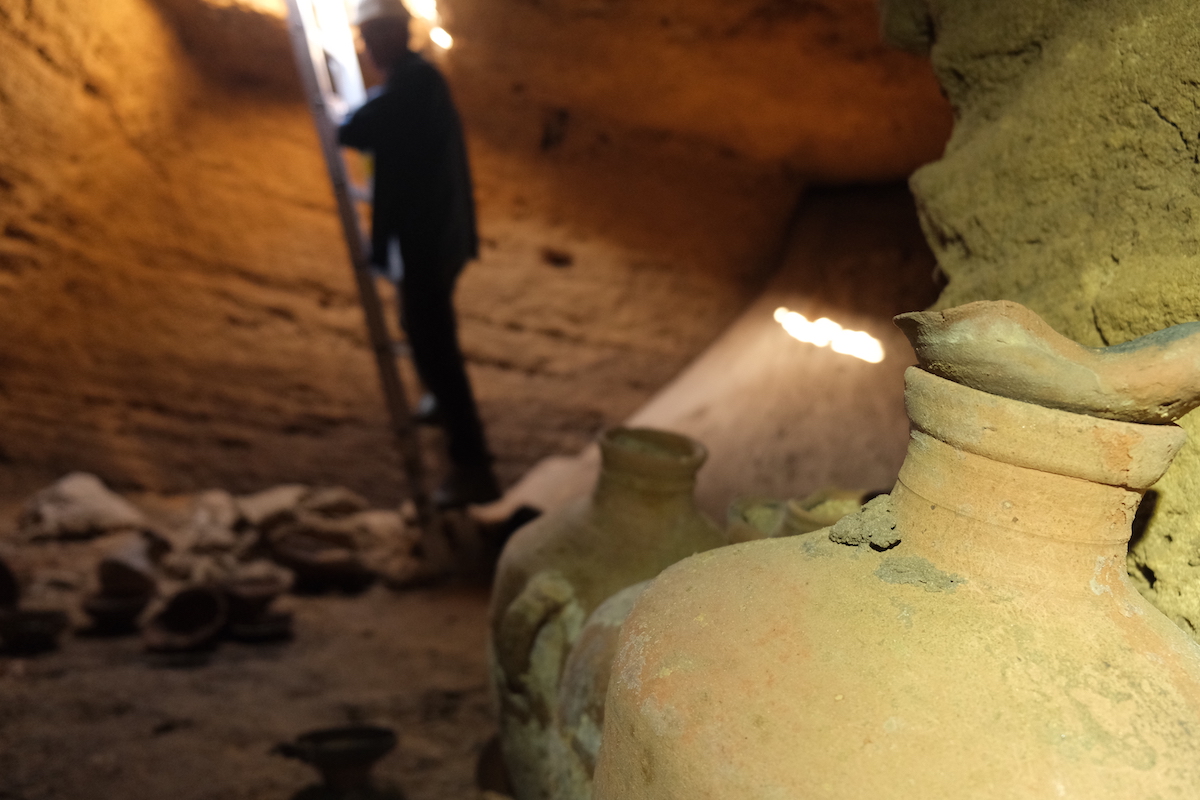Ancient burial cave with dozens of unique artifacts found in central Israel
The cave had been sealed for 3,300 years, a time capsule of ancient practices

In a “once-in-a-lifetime discovery,” a mechanical digger uncovered a preserved burial cave from the time of Pharaoh Rameses II, the king linked to the children of Israel’s exodus from Egypt.
The burial cave was found last Wednesday during the course of a development project at Palmahim Beach National Park on the coast south of Tel Aviv; the cave’s artifacts were seen laid out on the floor as they had been at the time of burial.
After the digger broke through the roof, revealing the site, the Israel Antiquities Authority sent Dror Citron to inspect the find. On site, he descended a ladder through the new opening and discovered a scene that reportedly appeared to have been frozen in time.
The cave was square, hewn into rock, with a central supporting pillar. Scattered on the floor were several dozens of artifacts of intact pottery and bronze, placed there during a burial ceremony about 3,300 years ago, to accompany the deceased into the afterlife in the belief they would serve them in the hereafter.

Bronze Age expert Dr. Eli Yannai for the Antiquities Authority described the find as “a once-in-a-lifetime discovery”.
“It is extremely rare to come across an ‘Indiana Jones film set’ – a cave floor laid out with vessels untouched for 3,300 years,” he said. “The fact that the cave was sealed, and not looted in later periods, will allow us to employ the modern scientific methods available today to retrieve much information from the artifacts and from the residues extant on the vessels – for example, organic remains that are not visible to the naked eye.”
A formal statement celebrating the discovery, made by Eli Eskosido, director of the Israel Antiquities Authority, and Raya Shurky, director of the Israel Nature and Parks Authority, also noted that “a few items were looted from the cave before it was sealed up, an issue that is now being investigated.”
Nevertheless, “the cave may furnish a complete picture of the Late Bronze Age funerary customs,” Yannai said. “The cave predominantly contains dozens of pottery vessels of different forms and sizes, including deep and shallow bowls, some red-painted, footed chalices, cooking pots, storage jars and lamps for lighting.”
Yannai identified several of the storage jars in the cave as having been manufactured along the Lebanese and Syrian coasts. Yannai said that other smaller containers in the collection, mainly jugs and juglets, which were used to store and trade smaller quantities of expensive commodities, were imports from Tyre, Sidon and other ports along the Lebanese coast, as well as from Cyprus. Such vessels were commonly used in burials, he said.

Bronze arrowheads or spearheads were found alongside the pottery. Yannai said that, judging from how they were found, they probably had been in a once-extant organic quiver.
“In this period, in the long reign of the 19th Egyptian dynasty Pharaoh Rameses II, the Egyptian empire controlled Canaan, and the Egyptian administration provided secure conditions for extensive international trade,” Yannai said. “These economic and social processes are reflected in the burial cave that contains pottery vessels imported from Cyprus and from Ugarit on the northern Syrian coast, as well as from nearby coastal towns, including Jaffa, Ashdod, Ashkelon, Gaza and Tel Ajjul.”
These findings are a clear indication “that the population of Yavneh-Yam (Palmahim Beach) played an integral part in the lively trading activity that took place along the coast,” Yannai said.
Following its discovery, the cave was sealed again and placed under guard.
Eskosido and Shurky, in their joint statement, called the discovery of the cave “unique and absolutely astonishing.”
“The news of the discovery of the cave spread like wildfire in the academic world, and we have already received requests from many scholars to take part in the planned archaeological excavation,” Shurky and Eskosido said. “Within a few days, we will formulate a plan to carry out the research and the protection of this unique site, which is a feast for the archaeological world and for the ancient history of the land of Israel.”

The All Israel News Staff is a team of journalists in Israel.














